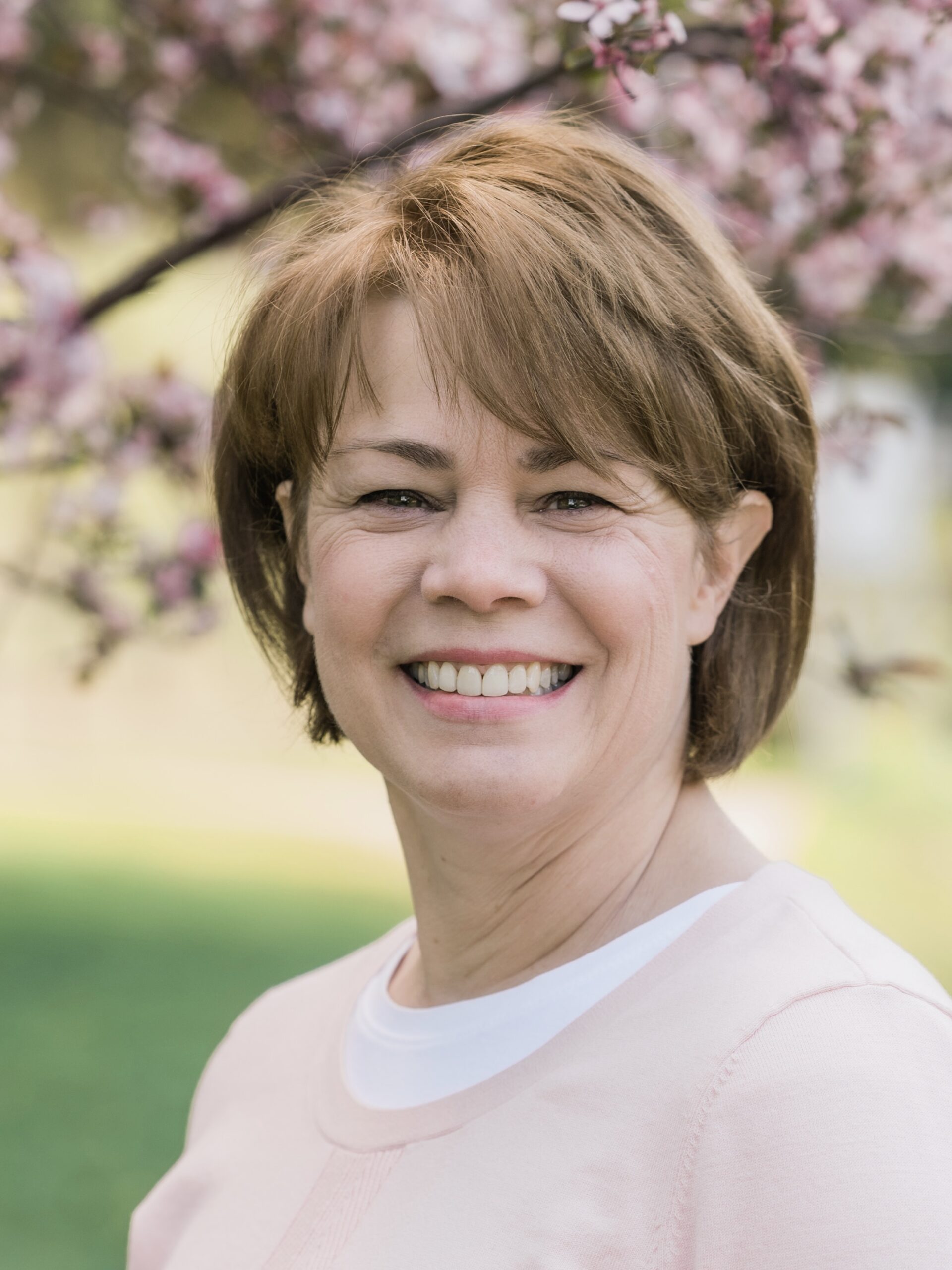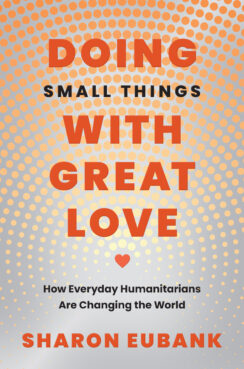
(RNS) — Every once in a while, I get to interview one of my heroes. I was thrilled to sit down with Sharon Eubank, director of humanitarian services for The Church of Jesus Christ of Latter-day Saints, via Zoom on Sept. 5.
Since 2011, when she began the role, the department’s budget has quintupled as it engages in relief projects around the world. Now, she is an author. Her book, “Doing Small Things With Great Love: How Everyday Humanitarians Are Changing the World,” will publish Sept. 16.
The conversation has been edited for length and clarity.
As director of humanitarian services for the LDS church, how much travel are you still doing around the world? What does a typical day look like for you?
When [the church’s] humanitarian services started in 1985 with the famine in Ethiopia, we were a little shop, just taking ideas and trying to implement them. I started work there in 1998. Over time, we specialized in some different things. Like, when I was running the wheelchair initiative, I was managing the budget, manufacturing relationships and volunteers. But we don’t do that these days. We are now so decentralized. A great portion of the budget and work goes out to the 24 regional offices run by area presidencies. So, now at headquarters, our job is to make sure they have the resources and information they need. We’re trying to spread best practices.
We do a lot of evaluative work. A lot of the things I do are building bridges between governments and church humanitarian services, trying to evaluate what works and what doesn’t in a landscape that’s constantly changing.
Like a lot of people, you used to feel reticent about sending cash as a charitable practice, but you have shifted a bit from that view. Could you describe the evolution?
I think all of us recognize corruption is real, and it ruins the ability to do a humanitarian project. I was ingrained as a young humanitarian that we just don’t give cash. But it turns out from a lot of research that corruption is not nearly as prevalent as we might think. When you give people cash and there’s no addiction present and no extortion, they just about 80% of the time will make defensible decisions with what they do with it.
It’s important because having cash reinforces their ability to choose. Sometimes one of the hardest things about going through a disaster is all your choices get taken away. You can’t decide where you live or what you eat, or whom you’re living with or what will happen to you. The tiniest little choice becomes really important.
 In the book, you stress listening to communities and people when they describe what they want. Sometimes what they want is not what humanitarians were planning to give.
In the book, you stress listening to communities and people when they describe what they want. Sometimes what they want is not what humanitarians were planning to give.
Yeah. One story was told to me by Michael Nyenhuis of UNICEF. They went into a community in Central America and said: “We really want to focus on your children’s health. We’d like to give you a local health clinic.” But the community said: “No, we don’t want a health clinic. We want lights for our soccer field.”
The community just wouldn’t give up. They said: “We want the kids to have a safe place at night to play soccer. They’re busy working and doing school, but night is the time we need them to be safe.”
Finally, UNICEF raised the money privately and figured out how to get them lights for the soccer field. It made such a huge change in that community, it became the focal point. Everybody came in the evenings to watch their kids play. It was bonding. The kids were getting physical exercise, and all kinds of other activities were happening.
There are many different iterations of that story, but it reinforces the idea to ask people what they want and then help them get it. Don’t assume you know better.
This seems to be an American issue. We’re very “take charge, get it done” people, but not necessarily the best at listening.
It’s not just Americans [laughing]. There’s a culture in the “developed West” that says: “I have education, I have wealth, I have experience. I am going to come in and teach you what you need to know.” The assumption is you’re ignorant, you’re poor, you have unproductive traditions. We devalue everything about that culture.
The greatest skill I ever learned in humanitarian work is to ask people what they want and then ask a bunch of questions around that. You’ve got to ask nine questions before you get down to the root cause, to what’s really going on. When we jump to an assumption, to the easy answer, we always make mistakes.
In the book, you share an amazing story about your family history and the Depression, which is connected to root causes.
Agnes and Ebert, my great-grandparents, emigrated from Norway and homesteaded a wheat property in Montana. They were working their guts out in the early 1900s, and then he got scarlet fever and died. Agnes had this giant property and two little boys and no way of farming it herself. It was 1931, the middle of the Depression. She moved to California with her sisters, but they didn’t have any source of income except that her oldest boy, my grandfather, had a paper route.
She was worried about nutrition for the boys, so she went to different agencies asking for milk. But as soon as they found out she still owned property in Montana, they were like, “Can’t do this. Go sell your land and then we’ll help you.” But she knew there was potential for the family to make money from that someday if there wasn’t a drought and the Depression. She would not sell.
One day my grandfather, Bill, came back from his paper route, and on their porch was a case of canned milk. Canned milk was valuable because you didn’t have to refrigerate it. There was a little tag that said it was from the Salvation Army. They had responded to her request without any prerequisites about selling the land.
I know this story from my mother, Bill’s daughter. When I was a little kid, whenever we’d go by one of those red kettle bell ringers, she’d hand me a $20 bill or a $50 bill and say, “Go put that in that bucket,” and she would tell me how the Salvation Army saved our family.
The main point about root causes is the Salvation Army had a long-term view. They could see that a property could sustain a family for 100 years, which it did. But in the short term, you need a little bit of help, and we’re willing to help you bridge that gap.
A lot of your book has the message of starting where you are. In humanitarian work, you want people to bloom where they are planted.
Sometimes we go into service with this idea that the giant things are the real work, but that’s not true. I learned this when I was in Southeast Asia doing humanitarian work after the terrible tsunami [2004]. We came across the national train sitting high on the tracks. People had lifted their toddlers up into that train before the tsunami since it was on higher ground and they thought it would be safer. But when the wave hit, the train tumbled five times, completely bent and broken. More than 1,500 people lost their lives in that train.
Five months later, when I got there, those families were still camped around that wreckage because it was the last place they were together as a family. They came up to me and were touching my arms and my hair and saying: “Please help me. I lost my baby. I lost my husband.” I was just standing there, mute. I didn’t speak the language so I couldn’t explain what I was doing. I didn’t have anything in my pocket. There was nothing I could do that was useful to them.
But Shanta, who was driving me and acting as my interpreter, was powerful in that situation. He could speak the language and understood the culture. He pumped up a soccer ball and started kicking it around with the kids. Then one of the ladies said, “Hey, you brought me that yeast,” and she gave him some of the bread she had made with it. Another lady said she needed washing powder, and he said he would try to bring some.
As I was standing there completely paralyzed, I looked at what he was doing and realized how much more powerful we are where we live. I was only going to be there for a brief moment, but Shanta would be there all the time. Our own community is where we can do the most transformational work because of all those nuances we understand.
The United States government has drastically reduced aid to other nations and is refusing to accept refugees. Does that make individual humanitarian efforts even more important?
Governments make decisions according to different administrations. Right now, we pulled back from a lot of work we were doing. I think great good has been done by governments in the name of their citizens. In some ways, I think we got used to having things done in our names, and we weren’t looking around actively for what we could do diligently every day. It’s a wake-up call.
Ask yourself: What do you care about? What is interesting and important to you — something you would sacrifice your time or energy for? What are you going to get involved in at a personal level?
I’m energized around child mortality rates. Huge progress has been made. Up until 200 years ago, half the kids died before they were 15. In 1950, it had gone down to 25%. In 2020, the global number was 4%. But in small-population countries that are quite developed, like Iceland or Norway, the number is 0.4%. That tells me this is a solvable problem. If we put enough care and interest around that, we can address it. The U.S. is 17th among developed nations for child and maternal death rates, and there’s no reason why we should be that.
